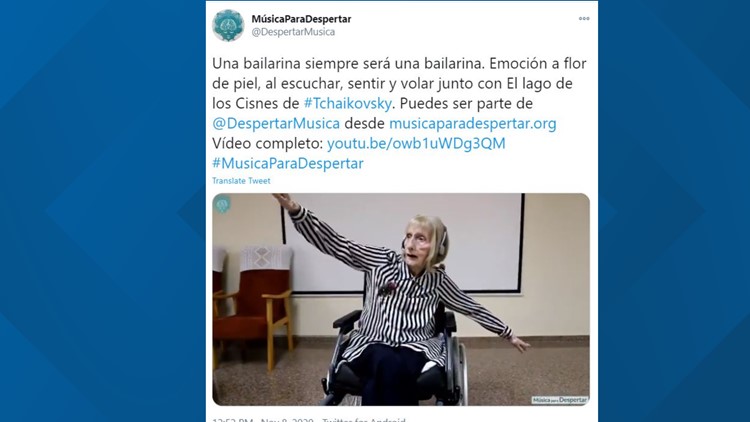Music has been known to reinvigorate dull environments, but to see how it can awaken parts of the brain affected by illness and age is an exciting scene to witness.
In a video that has seen a spike in popularity on social media this week, Spanish former ballet dancer Marta C. González is seen reliving her glory days as a ballerina as she listens to the composition "Swan Lake" by Giscard Rasquin and Pyotr Ilyich Tchaikovsky.
González died last year, the same year the video was taken, but it was recently shared on Twitter and YouTube by Asociación Música para Despertar (which translates to "Music to Wake Up To" in English), a Spanish advocacy organization which focuses on how music can help the elderly dealing with Alzheimer's.
It's moving to watch how González gently shakes her head as the music starts to move her, and you can almost see the moment the memories flood back as she starts to move as she once did as a ballet dancer to the songs she's listening to.
The video picked up steam online as it was shared on Twitter by Felipe Tristan, and associate conductor of the Brooklyn Symphony Orchestra.
And then it was shared again on Twitter by the award-winning Spanish actor Antonio Banderas, who himself described the video as emotional and powerful.
Not too much is known about González and her life as a ballet dancer said Asociación Música para Despertar's founder Pepe Olmedo, according to an interview with Cadena SER.
Olmedo says that González was from Valencia, Spain, and started to study ballet after she moved to Cuba. González was said to have been a successful ballet dancer in New York City according to purported newspaper clippings about her career, but that was still being confirmed, the New York Post said.
Music has been known to be a powerful tool in helping awaken the minds of elderly patients dealing with illnesses like Alzheimer's and dementia. In 2012, Live Science reported on an elderly man with dementia named Henry.
Henry initially seemed void of energy and slumped in his chair unable to recognize people close to him like his daughter. When asked, "do you like music," Henry perked up and said, "I'm crazy about music, play music, beautiful sounds."
Neurologists at the Boston University Alzheimer's Disease Center were researching the effects of music on memory. Andrew Budson, associate director for research at the center said with music's power on emotions, it can trigger those emotional memories, which are said to be "some of the more powerful memories that we have," according to Budson.
Henry said Cab Calloway was his favorite musician growing up so the researchers put headphones on him and played some music from that era. Henry immediately became full of energy and life, surprising those around him and making his caretaker emotional.
Henry, in his emotion, said, "It gives me the feeling of love, romance!"



